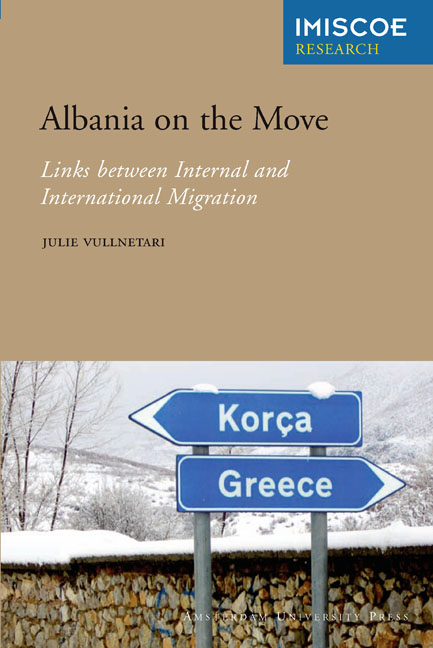Book contents
- Frontmatter
- Dedication
- Contents
- List of Tables, Figures and Photos
- Abbreviations
- Preface
- 1 Introduction
- 2 The Migration-Development Nexus
- 3 Albanian Migration and Development
- 4 Leaving Home: Migration Patterns and Dynamics
- 5 Across the Border: Migrants in Thessaloniki
- 6 Family, Migration and Socio-economic Change
- 7 Migration and Albania's Dynamic Transformation
- 8 Conclusions and Recommendations
- Notes
- References
- Other IMISCOE Titles
6 - Family, Migration and Socio-economic Change
Published online by Cambridge University Press: 19 January 2021
- Frontmatter
- Dedication
- Contents
- List of Tables, Figures and Photos
- Abbreviations
- Preface
- 1 Introduction
- 2 The Migration-Development Nexus
- 3 Albanian Migration and Development
- 4 Leaving Home: Migration Patterns and Dynamics
- 5 Across the Border: Migrants in Thessaloniki
- 6 Family, Migration and Socio-economic Change
- 7 Migration and Albania's Dynamic Transformation
- 8 Conclusions and Recommendations
- Notes
- References
- Other IMISCOE Titles
Summary
After the last chapter's sojourn in Thessaloniki, I now come back to Albania to examine the impacts that international and internal migration have had here. I start by analysing the resulting socio-economic transformations at the micro-level, i.e. how individual migrants and their families have been affected by migration over the past two decades. I open with a discussion of the effects that money sent by migrants abroad and internally has had on their families, but also others around them. I then continue with an analysis of various aspects of social remittances. This is followed by an examination of the gender and generational processes that have shaped and are shaped by migration. I conclude with some observations on the ways the Albanian family has adapted to the new era of migration. Throughout the analysis, I employ a temporal dimension to highlight change over the years.
The difference that money makes: Remittances
Financial remittances are one of the most important and obvious impacts of migration on migrants and their families. Here I discuss remittances sent from abroad and internal transfers. In both cases, I also examine the often-ignored reverse remittances, i.e. monetary or in-kind transfers that flow in the opposite direction, from Albania abroad or from the villages to urban areas. Finally, I pay attention to how they interact with gender.
International transfers
My findings on this theme confirm what has been found by other studies in the Albanian context, namely, that remittances have been crucial in enabling the economic survival of families and lifting them out of poverty (De Soto et al. 2002; King 2005).
If I were to make a list of the items remittances were spent on, it would include many of those highlighted in the literature (e.g. Gedeshi et al. 2003; King & Vullnetari 2003: 48; Nikas & King 2005) as follows:
– Basic survival needs of households such as food and clothing
– Improving the quality of life by enlarging or refurbishing the dwellings through repairs; replacements of roofs, windows and doors; installing a system for indoor running water; moving the toilet indoors; purchasing furniture and key domestic appliances
- Type
- Chapter
- Information
- Albania on the MoveLinks between Internal and International Migration, pp. 165 - 194Publisher: Amsterdam University PressPrint publication year: 2012



